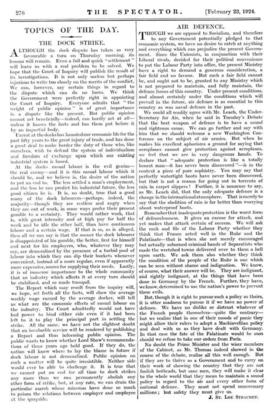TOPICS OF THE DAY.
THE DOCK STRIKE.
A.LTHOUGH the dock dispute has taken so very favourable a turn on Thursday morning, its lessons will remain. Even a full and quick "settlement " will leave us with a real problem to be solved. We hope that the Court of Inquiry will publish the result of its investigations. It is not only useless but perhaps injurious to write too closely on the merits of the conflict.
We can, however, say certain things in regard to the dispute which can do no harm. We think the Government were perfectly right in appointing the Court of Inquiry. Everyone admits that " the weight of public opinion " is of great importance in a dispute like the present. But public opinion cannot act beneficially—indeed, can hardly act at all— unless it knows the facts and has them put before it by an impartial body.
Unrest at the docks has haunted our economic life for the past fifty years to the great injury of trade, and has done a great deal to make harder the duty of those who, like ourselves, wish to defend the system of individualism and freedom of exchange upon which our existing industrial system is based.
At the docks casual labour is the evil genius— the real enemy—and it is this casual labour which it should be, and we believe is, the desire of the nation to put an end to. The less settled a man's employment, and the less he can predict his industrial future, the less good citizen he is. It is, no doubt, true that a good many of the dock labourers—perhaps, indeed, the majority—though they are restless and angry when they are out of work, in some ways prefer their present gamble to a certainty. They would rather work, that is, with great intensity and at high pay for half the week and be idle the other half, than have continuous labour and a certain wage. If that is so, as is alleged, then all we can say is that the sooner the dock labourer is disappointed of his gamble, the better, first for himself and next for his employers, who, whatever they may say, are demoralized by the presence of a turbid pool of labour into which they can dip their buckets whenever convenient, instead of a more regular, even if apparently more expensive, source for supplying their needs. Lastly, it is of immense importance to the whole community that an industry which affects it at every turn should be stabilized, and so made tranquil.
The Report which may result from the inquiry will, we hope, set forth all the facts, will show the average weekly wage earned by the average docker, will tell us what are the economic effects of casual labour on the industry. The Court admittedly would not have had power to bind either side even if it had been left to it to play the principal part in settling the strike. All the same, we have not the slightest doubt that an invaluable service will be rendered by publishing a Report and thus informing public opinion. The public wants to know whether Lord Shaw's recommenda- tions of three years ago hold good. If they do, the nation will know where to lay the blame in future if dock labour is not decasualized. Public opinion on such a matter will be quite irresistible. Neither side would ever be able to challenge it. It is true that we cannot put an end for all time to dock strikes any more than we can permanently abolish any other form of strike, but, at any rate, we can drain the particular marsh whose miasmas have done so much to poison the relations between employer and employee at the quayside.










































 Previous page
Previous page